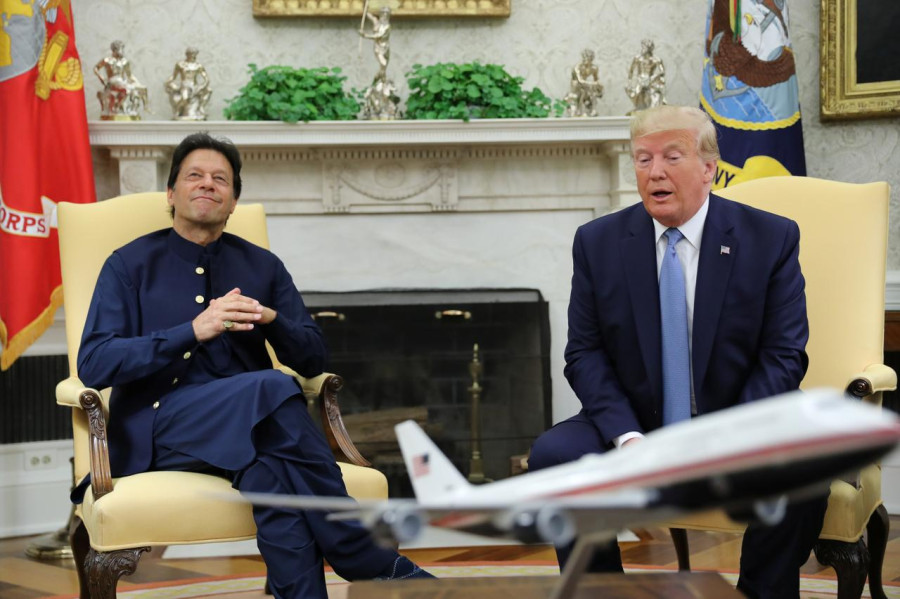Columns
Trump as Imran’s umpire
India may feel that mediation doesn’t suit its self-cultivated image as a regional power, but it has benefited from it in the past.
Jawed Naqvi
The idea of neutral umpires was given to cricket foremost by Imran Khan. The quaint invention has a longer precedence in diplomacy. Neutral umpires in the arena are called honest brokers. Imran Khan looked delirious with joy when Donald Trump said he could mediate or arbitrate the Kashmir dispute, and claimed to have Narendra Modi’s support if needed. A billion people would pray for Trump’s health, Khan had exulted, or something to that effect.
Two questions arise. Can Imran Khan really trust President Trump as an honest and discerning neutral umpire as, say, US Senator George Mitchell was in settling the Irish dispute with Britain 20 years ago? If Trump had the required credentials, he would not have backed a shady initiative with a fistful of US dollars to quell the Palestinian quest for a non-racial democracy in a shared homeland for Jews and Arabs.
The embarrassing offer came from Trump’s scandalously over-invested son-in-law. Suppose he dispatches this Man Friday to Srinagar, what would that imply for the Kashmiris, primarily, leave alone the nuclear-armed contestants?
Some do seem to have figured out Donald Trump, and American Democrats are not among them. The young Kim from North Korea has worked well on wrapping the all-powerful president of the most powerful nation on earth round his little finger.
Not too far behind are the Iranians. They have been at the receiving end of Trump’s more vicious streak. That has not deterred them from standing up for their sovereign pride and what they see as their political reason to exist. Iran is well aware that Trump didn’t terminate the fictional military attack on it by pulling back over his much advertised moral principle of saving 150 Iranian lives. The Iranians know as does the world that Trump has been complicit in the incalculable misery and mass murder in Yemen, and not just with lethal arms he sold to the Saudis in the manner of a Clint Eastwood character for a bag of gold, shooting down the obstructive sheriff the US Congress tried to play.
Trump is least bothered about lives. More accurately, he is terrified of getting stuck like his predecessors in a foreign conflict. In this, he is like Shakespeare’s allegorical cat in Macbeth that wanted the fish without wetting its paws—'Letting I dare not wait upon I would'.
The other question related to Trump is purposely facetious. Let us suppose Trump had turned around to Imran Khan at their joint media event, and, instead of offering to mediate or arbitrate on Kashmir, had said words to the effect: ‘Let’s put the question to the very athletic prime minister of Pakistan. He sees my friend Narendra Modi’s group as best suited to usher peace with Pakistan. I’m sure he has some very, very good ideas for believing in Modi. Given his hopes in the excellent man that Modi is, I’m sure he will work out a very good deal with the Indians.’
The facile question has a serious purpose. Khan said some time ago that Modi’s right-wing Hindu Bharatiya Janata Party was best equipped to resolve the Kashmir dispute. Grant all power to Khan and Modi. But where’s the evidence?
Given the amazing similarities between the US President and the Indian prime minister, Modi would likely have shredded the deal had one existed, say, between Manmohan Singh and Pervez Musharraf. Also after Trump’s image, the anger would not be summoned because the deal was bad for India. It would likelier be unacceptable because an opponent he reviled had signed it.
And, just as Trump is bent on offering an alternate deal to Iran with a new list of commitments on missile capabilities and political activities in the neighbourhood, Modi too may rehash the old Singh-Musharraf draft with a rider. It could come as the removal of the special status Jammu and Kashmir enjoys in India’s constitution. Modi, like Trump, is a businessman and businessmen are his political base. Ordinarily, non-Kashmiris aren’t allowed to own property in Kashmir, given the special constitutional provisions. To repeal the clause would be a euphemism for an economic and physical takeover.
At the worst of times between the US and USSR, communication channels remained open. And even then the two needed the mediation of UN secretary-general U Thant to terminate the threat that would have ended life on earth in 1962.
India may feel that mediation doesn’t suit its self-cultivated image as a regional power, but it has benefited from it in the past, and not only in the Tashkent pact or in the water treaty with Pakistan. India recently celebrated its soldiers in the Kargil conflict with Pakistan. Every nation celebrates its brave soldiers. But that doesn’t detract from the fact that the Kargil ‘victory’ was actually won in the diplomatic arena, to avoid using the word ‘mediation’, with President Bill Clinton’s intervention. Clinton said so in the Indian parliament and to applause from doting MPs.
There is nothing intrinsically wrong with mediation, except that it occasionally treads on someone’s acquired attitude. It was commendable that India and Pakistan welcomed the ruling of the International Court of Justice on the condemned Indian prisoner in Pakistan. Whether in peace or aggression, the foreign hand can produce unexpected outcomes. The ‘war on terror’ began with the Afghan Taliban in America’s crosshairs and could end with them for better or worse as the rulers of Kabul.
It would be uphill for India to accept the Taliban to keep up with Joneses and continue the military assault on Kashmir. Like all nightmares, the trauma of Kashmiris too shall pass, preferably despite Imran Khan’s faith in strange people. As Senator Mitchell recalls, there were 700 days of bad news waiting for that one day of happy tidings in Ireland. Importantly, unlike Kissinger in the Middle East or Holbrooke in Bosnia, Mitchell didn’t go to his mission on a gunboat.
This article was previously published in Dawn, a part of the Asia News Network.




 14.24°C Kathmandu
14.24°C Kathmandu















